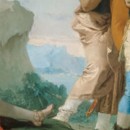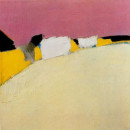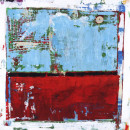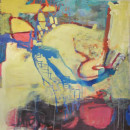Stanza Shaping in Horace
Contemporary styles notwithstanding, translators have generally grouped Horace’s Odes in four-line stanzas to reflect the continuity of content and the Latin measures, a practice often called Meineke’s Law after their originator. A few translators have gone further and devised individual stanza shapes to represent the Latin measures, the best known of whom may be John Conington. {1} It’s an approach that works happily enough in the lighter pieces, as in I 26: The Muses love me: fear and grief, The winds may blow them to the sea; Who quail before the wintry chief Of Scythian real, is nought to me. But comes to grief in the more demanding odes packed with detail, as here in IV 14 (16-20), using a 4 4 4 4 stanza shape spectandus in certamine Martio, deuota morti pectora liberae quanti fatigaret ruinis, indomitas prope...
Read More5 Poets in Artemis
Artemis is a showcase for women poets, reviewers and artists. It is published by Second Light Publications as a 60 pp + magazine twice a year, and especially features older poets who have been writing for years without proper recognition. The reviews in particular provide a handy round-up of who’s doing what on the UK poetry publishing scene. I have chosen five poems to illustrate the work available on line by courtesy of the London South Bank’s Poetry Library. Many are winners or runners-up in competitions. To start on a light-hearted note, Caroline Carver’s If you are stolen, call police (http://www.poetrymagazines.org.uk/magazine/record.asp?id=25960) puts together a list of delightful warnings from those whose first language isn’t English. It starts: The sea is dangerous Please don’t swim Once happen any accident At his own risk If going out hold walking lane always...
Read More5 Poets in Acumen
Acumen was started in 1985 by Patricia Oxley and is now a fat (120 page) production appearing three times a year, with articles, reviews, translations, but mostly poetry. Each issue contains around 50 poems, and the style is mainstream with an emphasis on what might be called an intelligent use of craft. Many contributors are well known on the UK poetry scene, but new poets are also found a place. Only three issues are currently online via the Poetry Library on London’s Southbank (issues 39, 46 and 50) and it is from issue 50 (September 2004) that I’ve selected five pieces for brief review. The pieces largely speak for themselves: I’ll just note the features that seem specially worthy of comment. Ghazal by Mimi Khalvati can be read at: http://www.poetrymagazines.org.uk/magazine/record.asp?id=21608 The aa etc. xa ya za aa rhyme scheme...
Read MoreVersions of Horace 3
This is the third and concluding post comparing translations of Horace Odes. Carmen One 28 Measure: First Archilochean: – u u – u u – / u u – u u – u u – x – u u – u u – u u – x Theme: Death comes to all. Latin and word-for-word translation: Te maris et terrae numeroque carentis harenae mensorem cohibent, Archyta, pulueris exigui prope latum parua Matinum munera nec quicquam tibi prodest aerias temptasse domos animoque rotundum percurrisse polum morituro. Occidit et Pelopis genitor, conuiua deorum, Tithonusque remotus in auras You, sea and earth and numberless sand surveyor confines you, Archytas, small dust near unimportant shore of Matinium offer nor are you worth round sky home and spirit scan sky you will die. Died and Pelop’s father, guest of gods Tithonus drawn into air...
Read MoreVersions of Horace 2
This is the second post comparing translations of Horace odes, and here we look at Book One Carmen 5. It’s in the Fourth Asclepiadean, which runs: – – – u u – / – u u – u x – – – u u – / – u u – u x – – – u u – x – – – u u – u – The third line pulls the movement up short, often giving it emphasis or special focus. The Latin and word-for-word translation are: Quis multa gracilis te puer in rosa perfusus liquidis urget odoribus grato, Pyrrha, sub antro? cui flauam religas comam, simplex munditiis? Heu quotiens fidem 5 mutatosque deos flebit et aspera nigris aequora uentis emirabitur insolens, Who much slender you boy on rose bathing liquid squeezing with scent pleasing, Pyrrha, under cave...
Read MoreVersions of Horace 1
I was once asked if it could be ‘fair’ to look at other translations before beginning one’s own work. Not only fair, was my reply, but essential, and not simply to glance at previous versions but study them carefully. Translation is not a competition, but a fraternity of interests where each practitioner learns from others, as happens in all the sensible professions. Originality can be overdone, and in a world awash with translations what is often needed is a wise eclecticism that recasts previous attempts in the crucible of imagination and proper understanding of poet and period. Many authors are now adequately translated, and further efforts, unless they most significantly improve on their forebears, are a waste of everyone’s time. 1. OVERVIEW The qualities that make the Odes of Horace worth attention are by their nature difficult to translate...
Read MoreAmiri Baraka
In 2002, a year after 9/11, the black American poet and activist Amiri Baraka read a long poem apparently criticizing America and including questions about the Israeli intelligence warning of an impending attack on the twin towers. (1) It was in his usual no-holds-barred, in-your-face style, (2) and the poet was writing from an establishment position as the poet laureate of New Jersey. The response was loud and predictable. The Jewish community accused him of anti-Semitism, and demanded his resignation. (4) The mainstream press demonized him as anti-American. (3) The literary world distanced itself from his views, but pleaded for artistic freedom. (5) No one pointed to the obvious, that firstly the poem came close to crude pamphleteering and, secondly, there was nonetheless a pressing need for a sustained, detailed and transparent investigation into the 9/11 material that Amiri...
Read MoreEmotion in Poetry
This is the second in a series on Coleridge and poetry. In the first I looked at Coleridge’s well known definition of poetry as the fusion of an unusual degree of emotion with an unusual degree of form, and suggested that a. words in poetry have a value beyond that of conveying a simple meaning (i.e. operate like elements in a painting) and b. poems ‘worked’ by having their constituents operate in different ways, which we might call their ‘functionality’. Once again, this will be a rather discursive post where I put down the points as they come to me. Perhaps, if results warrant it, and I can find the time, I’ll organize this material into a little handbook on reading contemporary and other poetry, but for the present you have an example of ‘I wrote a long article...
Read MoreColeridge and Poetry
In his popular introduction to Horace (1), L.P. Wilkinson has the task of showing how, or to what extent, the more prosaic of Horace’s odes are still poetry. By and large, the Romans were a pragmatic and unimaginative people, and Horace’s qualities – meditation, restraint, balance, tact and urbanity – are not those commonly associated with higher flights of literary creation. Even the Greeks, who urged moderation in all things, gave pride of place to passion. ‘I would confidently maintain’, says Longinus, ‘that there is no tone so lofty as that of genuine passion in the right place, when it bursts out enthusiastically as though through some kind of madness and inspiration, and fills the spoken words with frenzy’. (2) But that passion had to be held in check, restrained by economy and a faultless control of the medium....
Read MoreThe Yale Review
What the oldest literary review in America is now publishing is the motive for this brief note on brief poems. Founded in 1819, the Yale Review is today under the editorship of the poet and literary critic J.D. McClatchy. It aims to give its distinguished authority to ‘bold established writers and promising newcomers, to both challenging literary work and a range of essays and reviews that can explore the connections between academic disciplines and the broader movements in American society, thought, and culture.’ Because back issues give only a contents listing of contributors (though many are well known) I can only comment on the current edition, which provides a reasonable selection of its poetry. Speculation and elegance (to again quote the quarterly’s aims) are prominent in the five pieces I present here. All are modest in intention and muted...
Read More4 Poets in Word Riot
Word Riot is an online literary magazine that features poetry, flash fiction, short stories, non-fiction and excerpts of novels. It was founded in 2002, and was followed a year later by the Word Riot Press, which publishes poetry collections, anthologies and novels. The website is not particularly attractive, but the contributors are all professionally presented, despite many being young, at college still or attending MFA courses. What an appreciable number of them do achieve in recent issues of Word Riot, however, is an enviable naturalness of expression: the work has not always great depth or emotional charge, but the voices are fresh, believable and unpretentious. Melissa Ho (whose Orange Acid and Other Admissions of Guilt can be read at: http://www.wordriot.org/archives/6761) is in fact only sixteen, but the work is strikingly original and difficult to classify exactly. I do not...
Read MoreD.A. Powell
Douglas A. Powell rose to prominence with three collections of poems that documented the gay scene in America and the death by AIDs of well-loved friends: Tea (1998), Lunch (2000) and Cocktails (2004). The style was one he made distinctly his own (and indeed won a clutch of prizes for): long fluid lines, untitled, no capitalization, extended metaphors, double-entendres and a vibrant mix of contemporary diction that included sexual explicitness and gay talk. Take darling can you kill me: with your mickeymouse pillows from Lunch {1} it’s quieter than most poems but is often singled out for special mention. darling can you kill me: with your mickeymouse pillows when I’m a meager man. with your exhaust pipe and hose could you put me out: when I’m a mite splinter a grain a tatter a snip a sliver a whit...
Read More










